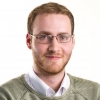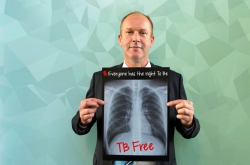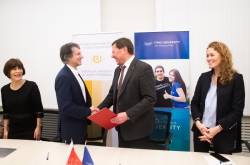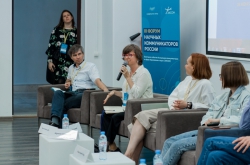The World Conference of Science Journalists (WCSJ) is held biennially. In 2019, the next conference will be organized by two major universities: the University of Lausanne and the Federal Polytechnic School of Lausanne (EPFL). This was made possible due to a joint application made by the three Science Journalists’ associations of Switzerland, France, and Italy. As a representative of Eastern Europe, Russia has made its own contribution to the application: ITMO University and the Russian association of science journalists AKSON have proposed to include a press-tour of Russia’s top scientific and academic institutions in the event’s program. The proposal has been approved by the event’s organizers; therefore, in preparation for the 2019 event, a delegation of science journalists from all over the world will come to Russia.
“This is an opportunity for our international colleagues to familiarize themselves with the work of Russian scientists and help integrate our science into the international infosphere. We want to show our colleagues from abroad that we’re ready to participate in forming the agendas and trends in the fields of science communication and journalism and, therefore, facilitate the development of these fields in Russia,” – commented Dmitry Malkov.

Dmitry Malkov
“I myself believe that science always benefits from broad cooperation among scientists, no matter where they come from. In the same way, science journalism is becoming more relevant and qualified on a global scale. The international community enriches our efforts to create a strong, competent and critically-thinking professional community,” – added Fabio Turone, head of Italy’s Association of Science Writers and member of the Lausanne conference team.
Many science journalists and communicators all over the world will take interest in an exchange of experience with their Russian colleagues and will want to know more about the latest advancements in Russian science, noted Turone. He, too, plans to visit Russia and ITMO University in particular.
This year, more than 1,300 science journalists, scientists, and representatives of companies and foundations have come to San Francisco; however, Russia was only represented by employees of ITMO’s Center for Scientific Communication – Dmitry Malkov and Alexandra Borissova. Alexandra is also the co-founder of AKSON and will teach classes at the new Master’s degree program in Science Communication at ITMO. She has previously held the position of Science Editor at Gazeta.ru, took part in opening the first press-service at the Moscow Institute of Physics and Technology (MIPT) and the launch of the popular-science online publication “Cherdak”.

Alexandra Borissova
The event’s list of speakers included a great deal of renowned scientists and public figures. Jennifer Doudna, one of the leading developers of the CRISPR/Cas9 genome editing technology, spoke about the technological and ethical effects of the her discoveries’ applications. John Holdren, former senior advisor on science to President Barack Obama, spoke about the irreversible harm of climate change denial. Susan Desmond-Hellman, CEO at Bill & Melinda Gates Foundation, spoke about the ways to fund science in a time when governments turn away from evidence-based decision making and data-driven science.
Other, more work-specific questions, such as the use of statistics or use of social media and networks in promotion of science, were also discussed.
“At the conference in San Francisco I was always received with genuine interest in myself as both a representative of the Russian SciComm community in general and AKSON in particular. I’ve developed ideas for joint projects and useful contacts that I’m anxious to share with my colleagues in mass media and universities. Our task right now is to get more Russians to participate in the conference in Lausanne and expand our professional network,” – said Alexandra Borissova.

Susan Desmond-Hellmann's talk at WCSJ-2017
The participants spent one of the conference’s days at a university of their choice: either the UC Berkeley or the UC San Francisco. As Dmitry Malkov explains, no matter the field – be it nuclear physics, crystallography, robotics or ecology – the scientists there were well-prepared for discussing scientific matters with journalists and general audiences.
In Russian universities, scientists are only starting to understand the importance of their role in the popularization of science. Attempts at systematic promotion of science are being made at select locations – mostly at the participating universities of Project 5-100.
“At the Center for Scientific Communication, we try to look at this issue on the grand scale, to change things on a national level. Our Master’s degree program in Scientific Communication is one such attempt to fulfill that goal. We want it to at least partially remedy the deficit of qualified science communicators and journalists in Russia,” – explained Malkov.
It is important to create opportunities for the development of professional skills in Russia’s science journalists. “Bridges” must be built between scientists and science communicators in order to make their interaction clearer to both sides. But even that’s not enough. There must be a demand for scientific journalism; science and science news must gain more prestige among those who work in mass media. Dmitry Malkov gives an example: surprisingly few people know what the ITER project is. Meanwhile, ITER is an international project for the construction of an experimental nuclear fusion reactor – a massive installation that will test the possibility of achieving energy-efficient nuclear fusion. The megaproject began construction in 2007, it is hugely expensive and Russia is taking an active part in its construction; yet, very few are aware of it.

Construction of ITER
Another example is the recently-launched XFEL facility in Germany – this X-ray free-electron laser will allow scientists to measure chemical reactions and observe the dissipation of molecules. Russia is also a participant of the project. Research that will be conducted there has the potential for breakthrough discoveries in medicine, energy science, and other vital fields. Yet, few know how it works, what is done there and which Russian experts participate in its operation. ITMO University also plans to conduct its projects at XFEL, while Dmitrii Potorochin, a Ph.D. student at ITMO, has already joined a team of scientists developing projects for the mega-facility.
“There are numerous large-scale scientific projects in Russia that will have a great effect on our lives, even on an everyday level. These kinds of news are just as important as politics or economy. We hope that science communication will develop rapidly in Russia. Our involvement in the international community and such organizations as the World Federation of Science Journalism, which AKSON plans to join, will play a major role in this process,” – said the head of ITMO’s Center for Science Communication.






